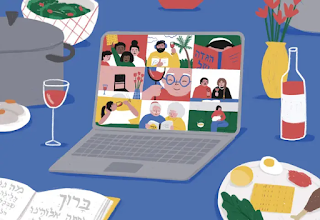First Night of Passover
✠ | CLICK TO VIEW TODAY'S READINGS
The Jewish Holiday of Passover is the most celebrated of all Jewish Holidays, among Jewish communities around the world, but part of the beauty of the holiday is “all who are hungry shall come and eat” and thus we find so many people of all faiths joining together for a Passover Seder. Seder means order, and the benedictions and prayers have a set order as we get to a tasty meal.
The most wonderful and famous Rabbi Abraham J. Twerski, M.D., who we recently lost, guides us during this holiday. His book is entitled “From Bondage to Freedom”.
The Matzoh is the bread of affliction. As the Jews left Egypt, they had no time to wait for the dough to rise, and so they baked Matzoh, a flat bread. Under Jewish Law, the matzoh must be baked for only eighteen (18) minutes. It is fascinating to visit a matzoh bakery and see how they adhere to these strict rules.
Passover is the exodus from Egypt after hundreds of years of slavery. We are told in the Haggadah, which is the prayer book for conducting the Seder, that each and every one of us has to feel as though we were coming out of Egypt and out of bondage. This is not only history, but it must be an everyday experience for us. Certainly, we can apply that today, with the many rules surrounding the world of mandatory stay at home orders, lockdowns and quarantines.
The meaning of the Exodus as stated in the Torah, the Five Books of Moses, Exodus 13:3, “Remember this day on which you departed from Egypt from the house of bondage, for with a strong hand G-d removed you from there.” Dr. Twerski, a noted psychiatrist related this to modern day bondage of alcoholism and drug addiction, some relationships and work. Rabbi Twerski always professed that chemical addiction is characterized by a lack of spirituality.
To do Passover right, we have to prepare. There are strict rules about cleaning our homes of chametz which are products made of dough that has risen. The idea is to be humble, shed our overinflated egos, and be more like a flat piece of matzoh. The day before the holiday, which lasts for eight (8) days. We burn the chametz and renounce any ownership of it. Of course, all foods are required to be kosher, approved by rabbinical authorities, and all labeled especially “KP”, Kosher for Passover.
One of the highlights of the Seder is when the youngest child reads the Four Questions, for the idea of Passover is for every generation to be involved and ask questions. The first question is “Why is this night different from all other nights?”, and the answer is. “on all other nights we eat chametz and matzoh, but on this night only matzoh.”
At the Seder we enjoy questions concerning the four sons or daughters, a wise one, a wicked one, a simple one, and one who is unable to ask. It is always fun to see who around the table is the “wicked one” as we read what each one says.
We are all one, all part of one another, and encompass all of these elements. Today we add a fifth son or daughter. The one who was lost in the Holocaust, or the one who does not come to the Seder.
As the Seder concludes, we sing Hallel songs of blessings, and always close with the words, NEXT YEAR IN JERUSALEM.
Call a friend and get invited to a Seder. It is a fabulous experience, the food always great and plentiful, and you will leave with a renewed spirituality.


Comments
Post a Comment